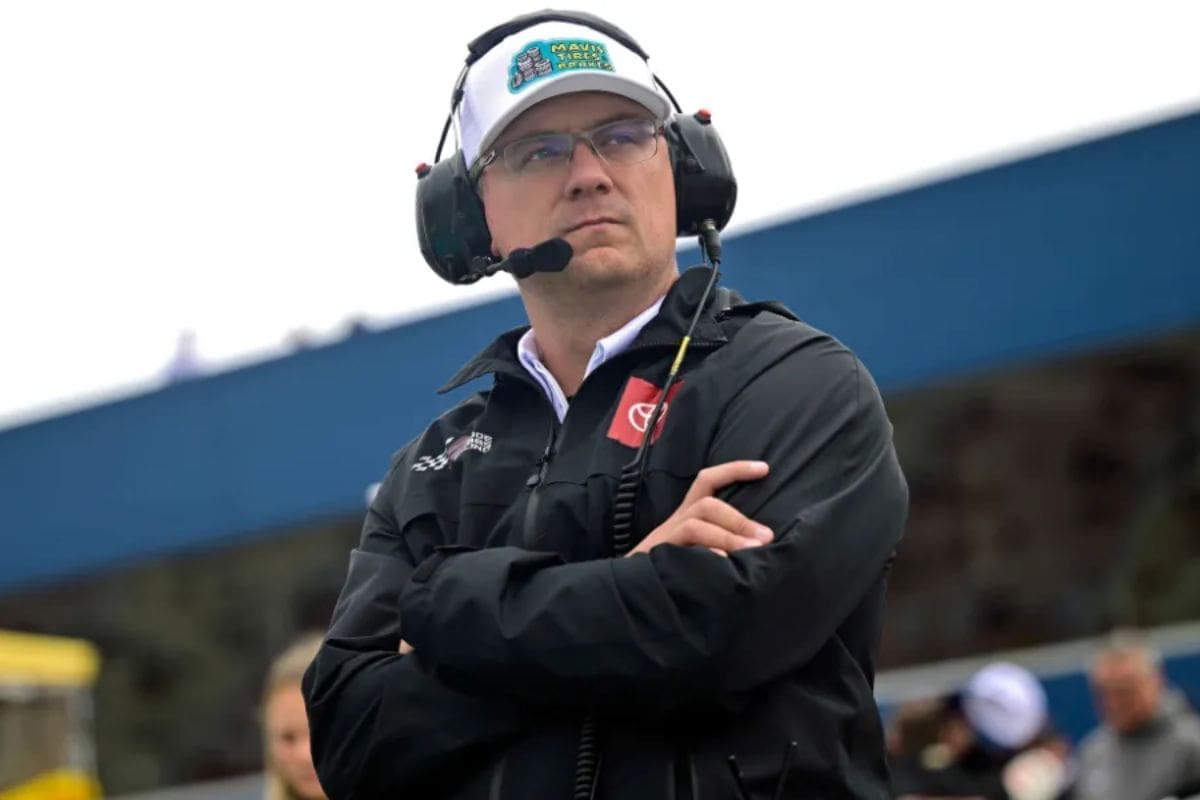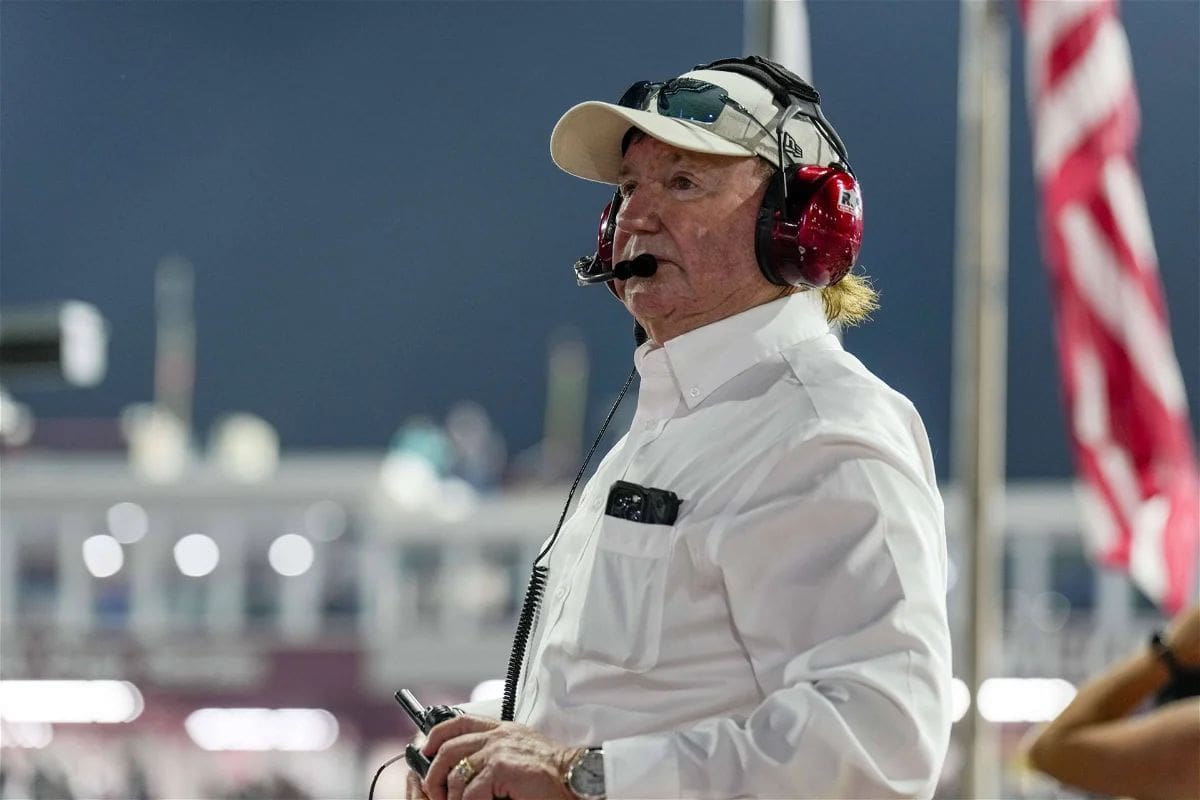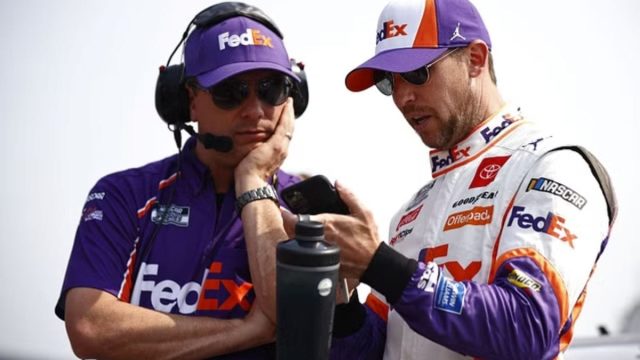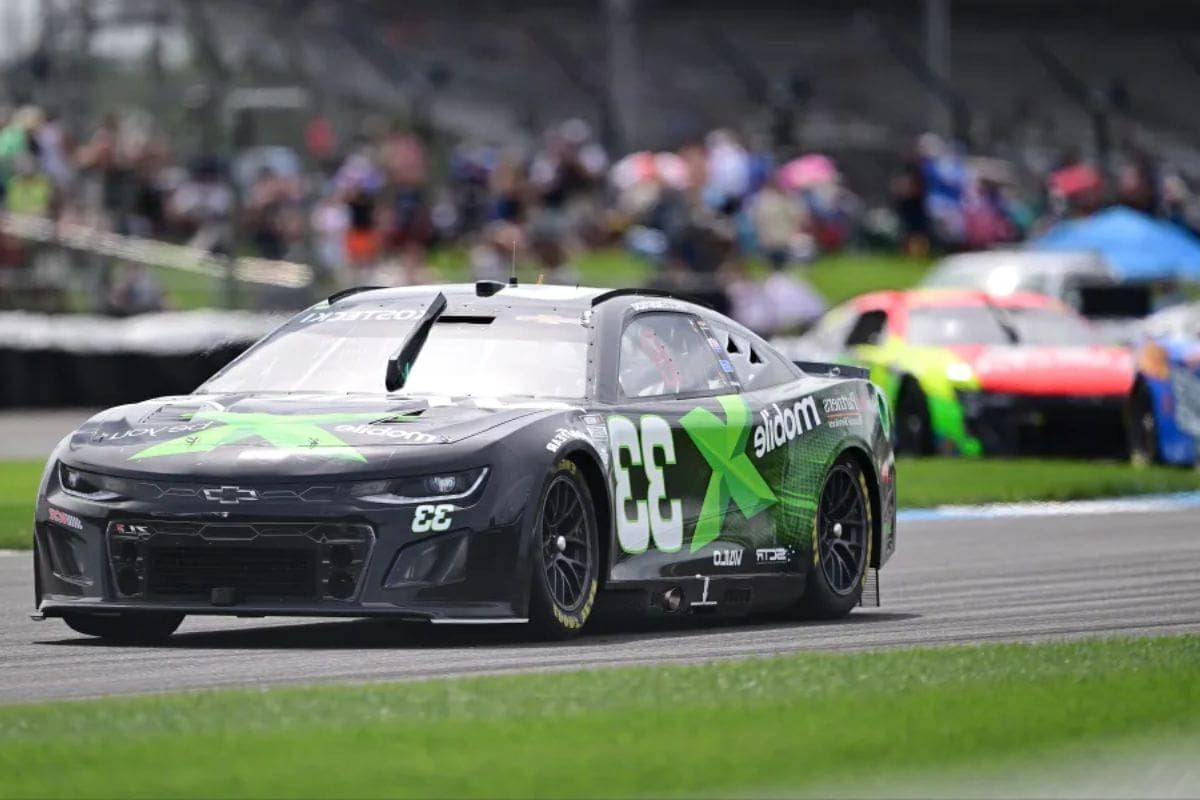Denny Hamlin’s Crew Chief Slams RCR: Denny Hamlin‘s crew chief has ignited a notable debate within the NASCAR community by criticizing both NASCAR’s officiating and Austin Dillon‘s aggressive tactics during his controversial win at Richmond. The remarks emphasize a growing frustration regarding the integrity of race outcomes and the ethical standards maintained by teams. This incident not only highlights the contentious nature of competitive racing but also raises pressing questions about accountability and potential regulatory reforms in the sport. As the implications of these criticisms unfold, one must consider how this might reshape the dynamics within NASCAR moving forward.
Key Highlights
- Denny Hamlin’s crew chief criticized Austin Dillon’s aggressive driving, labeling it as opportunistic and detrimental to racing integrity.
- Concerns were raised about NASCAR’s inconsistent handling of race outcomes, affecting competitive fairness and trust among teams.
- Crew chiefs emphasized the need for skill over reckless tactics, with disappointment voiced over Dillon’s controversial maneuvers leading to collisions.
- Richard Childress defended Dillon’s actions as part of racing dynamics, calling for clearer guidelines on acceptable conduct in the sport.
Richard Childress Racing’s Controversial Win at Richmond
Richard Childress Racing’s recent victory at Richmond has sparked considerable controversy, raising critical questions about the fairness of racing tactics employed during the final lap. The climax of the race saw Austin Dillon steering through a chaotic scene where aggressive driving led to notable collisions among competitors. Many argue that Dillon’s actions, particularly in the final moments, were not only opportunistic but also reckless, ultimately compromising the integrity of the competition.
The ensuing backlash from frustrated crew chiefs highlights a growing discontent among teams that felt victimized by Dillon’s actions. As racing escalates in intensity, the line between competitive strategy and reckless driving becomes increasingly blurred. The incident at Richmond serves as a case study in the ethical considerations inherent in motorsport, particularly regarding how driver conduct is perceived and regulated.
While racing is inherently unpredictable, the degree to which Dillon capitalized on the misfortunes of others has raised alarms about the potential normalization of such tactics. Critics contend that NASCAR must take a more proactive stance in enforcing rules that govern driver behavior to maintain a level playing field.
The aftermath of this race not only puts Dillon’s integrity into question but also places the entire NASCAR framework under scrutiny. As stakeholders debate the implications of this controversial victory, it becomes evident that the sport must confront its evolving standards of fairness and competitive integrity to preserve its credibility.
Crew Chiefs Call Out Austin Dillon’s Win
The controversy surrounding Austin Dillon’s victory at Richmond has prompted sharp criticism from the crew chiefs of both Joey Logano and Denny Hamlin, who assert that Dillon’s win was not achieved through fair racing practices.
While Dillon demonstrated impressive speed throughout the weekend, particularly in practice, his tactics during the race raised eyebrows among his competitors.
Despite starting from a position beyond 30th and climbing into the top five, Dillon’s strategies during the final laps have been scrutinized. As he attempted to overtake Logano, his aggressive driving led to a significant bump that resulted in Logano spinning out and crashing into the wall. This incident has been characterized by Logano’s crew chief as a reckless move that undermines the integrity of competitive racing.
Denny Hamlin’s crew chief echoed these sentiments, emphasizing that such actions should not be condoned in a sport that values skill and strategy. They contend that Dillon’s late-race aggression was less about racing talent and more about opportunism, exploiting the misfortune of others rather than earning his position through clean racing.
Crew Chiefs Express Disappointment
Amid the fallout from the controversial finish at Richmond, crew chiefs from across the NASCAR landscape have openly expressed their disappointment, criticizing both the actions taken during the race and the implications for the sport’s integrity. Joey Logano’s crew chief, Paul Wolfe, lamented the situation, stating, “It’s really disappointing that NASCAR allows stuff like that to go on.” Such sentiments are echoed by Denny Hamlin’s crew chief, Chris Gabehart, who took to social media to voice similar concerns.
I’m not sure really what to say about that, I mean it’s as far from racing as you can get. It’s really disappointing that NASCAR allow stuff like that to go on.” – Wolfe
I'm proud of Paul here. And anyone who knows him and how classy he is fully understands the magnitude of what we saw last night when you watch this clip.
I am confident @NASCAR will do the right thing. https://t.co/s8ZYhqkbdY
— Chris Gabehart (@CG1751) August 12, 2024
The reactions from these team leaders highlight a broader discontent brewing within the NASCAR community. As details surrounding the final laps of the Cook Out 400 continue to circulate, the integrity of racing practices is increasingly being scrutinized. The potential for deliberate actions to alter race outcomes raises questions about the sport’s credibility.

RCR’s History of Controversies
RCR has a notable history of controversies that raises questions about the team’s adherence to NASCAR’s competitive standards. These incidents not only highlight potential ethical dilemmas but also challenge the integrity of the sport itself.
As racing fans and analysts scrutinize RCR’s actions, several key events stand out:
- Sheldon Creed’s Fine: Last year, Sheldon Creed faced a $25,000 penalty for deliberately wrecking another driver, Sammy Smith, during a race in Nashville. The implications of team strategy and communication were central to this incident.
- Team Radio Commands: Similar to the recent controversy involving Denny Hamlin’s crew chief, RCR has previously been scrutinized for commands relayed over team radios that suggest intentional race manipulations.
Each of these controversies not only reflects on RCR’s management but also sets a precedent for how competitive integrity is perceived in NASCAR.
As the series continues to evolve, the scrutiny surrounding RCR may prompt deeper investigations into the practices and philosophies that govern team conduct.
Richard Childress’ Defense
Richard Childress has staunchly defended his team’s actions, asserting that incidents on the track are a natural part of racing and not indicative of foul play. In a sport characterized by significant risks and competitive fervor, Childress emphasized that contact between cars is an inevitable aspect of racing dynamics. He pointed out that both Team Penske and Joe Gibbs Racing would likely have engaged in similar tactics under comparable circumstances, highlighting a shared understanding among seasoned teams regarding the realities of racing.
However, Childress’s assertion raises notable questions about the boundaries of acceptable conduct on the track. While he defends the aggressive nature of the competition, there is a critical need for clarity on what constitutes fair play versus foul play. Paul Wolfe’s remarks highlight this tension, as he argues that behaviors perceived as outright wrecking detract from the integrity of the sport. The challenge lies in differentiating tactical racing from reckless aggression, a distinction that requires careful consideration from both teams and officials.
“Like at some point we’re gonna have to make the call on what’s acceptable and not. Flat out just wrecking someone, that’s not racing. So, we’re a racing series or what are we?” – Paul
As NASCAR navigates this complex landscape, the dialogue surrounding sportsmanship and competitive ethics will remain essential. The league’s Senior VP of Competition has indicated that while stripping drivers of their wins is not the desired culture, potential repercussions may loom for actions deemed excessive. Ultimately, the resolution of this controversy may shape not only the immediate competitive environment but also the long-term perception of racing ethics within the NASCAR community.

News in Brief: Denny Hamlin’s Crew Chief Slams RCR
The recent criticism directed at Austin Dillon’s tactics during the Richmond race highlights a growing concern within the NASCAR community regarding competitive integrity and accountability.
The repercussions of such controversial victories may prompt a reevaluation of existing regulations and ethical standards in the sport.
As calls for reform intensify, it remains crucial for regulatory bodies and teams to similarly address these issues to preserve the authenticity and fairness that fans and participants expect from NASCAR racing.
ALSO READ: Denny Hamlin Impressed by Riley Herbst Ahead of Richmond Audition

